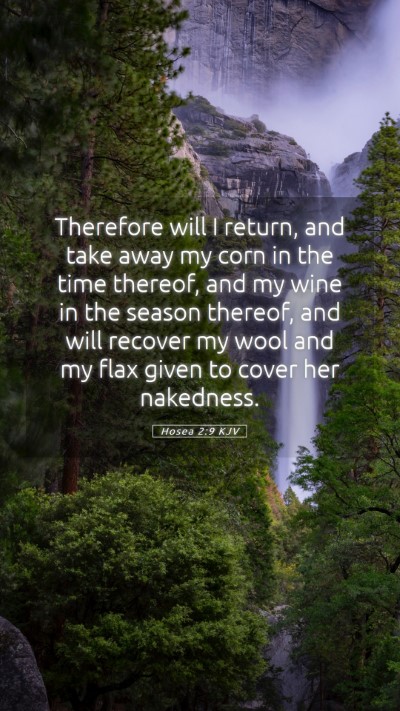Old Testament
Genesis Exodus Leviticus Numbers Deuteronomy Joshua Judges Ruth 1 Samuel 2 Samuel 1 Kings 2 Kings 1 Chronicles 2 Chronicles Ezra Nehemiah Esther Job Psalms Proverbs Ecclesiastes Song of Solomon Isaiah Jeremiah Lamentations Ezekiel Daniel Hosea Joel Amos Obadiah Jonah Micah Nahum Habakkuk Zephaniah Haggai Zechariah MalachiHosea 2:9 Meaning
What is the meaning of Hosea 2:9?
Therefore will I return, and take away my corn in the time thereof, and my wine in the season thereof, and will recover my wool and my flax given to cover her nakedness.
Hosea 2:9 Bible Verse Meaning
Bible Verse Commentary on Hosea 2:9
The verse Hosea 2:9 states: "Therefore will I return, and take away my corn in the time thereof, and my wine in the season thereof, and will recover my wool and my flax given to cover her nakedness."
Understanding Hosea 2:9
In this scripture, the Lord expresses His intention to withdraw blessings from Israel due to their unfaithfulness. This commentary combines insights from various public domain sources to enhance our understanding of the verse:
-
Matthew Henry:
Matthew Henry emphasizes the theme of divine judgment in Hosea. He suggests that the removal of agricultural prosperity—corn and wine—symbolizes God taking back His blessings due to Israel's infidelity. The use of "my" highlights the personal relationship between God and His people, indicating how their disobedience strains this bond.
-
Albert Barnes:
Albert Barnes notes that the corn, wine, wool, and flax are all essential to sustaining life and provide a metaphorical understanding of how God provides for His people. When Israel turns toward idolatry, they forsake the source of their blessings, leading to a spiritual and physical famine. Barnes indicates that this withdrawal serves both as a punishment and a wake-up call for repentance.
-
Adam Clarke:
Adam Clarke offers an interpretation that God, in withdrawing His blessings, aims to teach Israel a lesson about dependence and fidelity. He highlights the nakedness that comes from losing divine support, illustrating Israel's vulnerable state without God's provision. Clarke’s analysis focuses on the hope that this loss can prompt a return to righteousness and repentance.
Thematic Elements
-
Divine Retribution:
This verse exemplifies the principle of reaping what one sows, as it conveys the consequences of Israel's actions. The withdrawal of essential resources signifies a just response to their unfaithfulness.
-
God’s Faithfulness:
Even in judgment, there is an underlying tone of hope and the possibility of restoration found in the eventual return of God's favor upon Israel through repentance and renewal.
-
Spiritual and Physical Connection:
The physical goods mentioned (corn, wine, wool, flax) correlate with spiritual well-being. The loss of material blessings reflects a deeper spiritual decay that needs to be addressed through repentance.
Applications for Today
For modern readers, Hosea 2:9 has significant implications:
- It reminds believers to maintain their relationship with God, as spiritual neglect can lead to a loss of divine blessings.
- The verse encourages self-examination regarding one’s reliance on material goods versus reliance on God for sustenance and well-being.
- In families or community discussions within Bible study groups, this scripture can prompt discussions about faithfulness and the importance of trusting God in all areas of life.
Related Bible Cross References
- Deuteronomy 28:38-40: The consequences of disobedience to God’s commands.
- Isaiah 1:19-20: The call to obedience and the resulting blessings or curses.
- Jeremiah 5:24: A recognition of God as the provider and the expectation of seeking Him.
Conclusion
Hosea 2:9 serves as a potent reminder of the relationship between God and His people, highlighting the consequences of unfaithfulness and the hope for restoration. Understanding such scriptures is vital for deepening one's Bible study insights and enhancing one's Bible verse understanding. Through commentaries and Bible study resources, believers can gain invaluable Bible verse explanations that can apply to their lives today.


